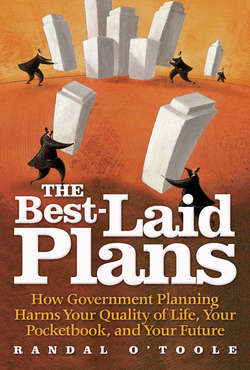Читать книгу The Best-Laid Plans - Randal O'Toole - Страница 29
На сайте Литреса книга снята с продажи.
The Democracy Problem
ОглавлениеWhen confronted with criticisms about their plans, planners often point to their public involvement processes. “Hundreds of people came to our meetings and commented on our plans,” they say. “So we must be doing something right.”
Wrong. Planning is inherently undemocratic. Efforts to involve the public mainly attract people who have a special interest in the outcome of the plans. As one Oregon pollster dryly reported, the people who actually commented on Portland’s regional plan “hold views that are not necessarily reflective of the community as a whole.”23
There is a good reason for this. People have a limited amount of time in their lives. They are inclined to spend that time on things that they can influence and that affect them the most. They will spend time studying cars because when they buy a car, they get the benefits and, if they make a mistake in their purchase, they pay most if not all the costs. But few people will spend much time on elections because their vote is unlikely to influence the outcome and, even if it does, the cost of any mistake they make is shared with everyone else.
Planning processes are even less likely to attract the public than elections. Getting involved in planning requires a much greater commitment of time than simply voting, and the process is so nebulous that there is no assurance that planners will even listen to the public. The planners in charge will rarely commit to any kind of voter democracy, that is, to agreeing to abide by the preferences expressed by the public during the process.
At the same time, some groups have a strong interest in getting involved in planning either for ideological reasons or because planning can enrich their businesses. The usual result when a few special interests get involved in a process ignored by everyone else is to develop a plan that accommodates the special interests at everyone else’s expense. This is why rail transit, for example, has become so popular: although it does nothing that buses can’t do as well or better, it costs far more than buses, and the companies that stand to profit from it promote it among politicians and are even hired by planners as “independent experts” to develop regional transit plans.
Even if public involvement processes could be truly democratic, planners are not sure they want them to be. This is confirmed by a national survey of planners. While more than three out of four believed that public involvement was important for identifying problems, less than half the planners surveyed believed that members of the public “[had] the requisite reflective ability to contribute” to later stages in planning. Instead of truly believing in public involvement, most “planners think of the planning process as an intellectual activity in which substantive expertise, the planners’ forte, is the primary requirement,” so the average member of the public is not qualified to participate.24
In fact, many planners viewed public involvement as merely an opportunity for politicians to stifle the good recommendations made by planners. As a result, “some planners advocate increasing the statutory authority of planning departments, so that planners’ recommendations can have the force of law.” “There is little recognition,” comments the planner who did the survey, “that political constraints on planners’ influence may reflect public concerns about limiting the role of experts in democratic decision making.”25
In public, most planners give lip service to democracy, but among themselves they take a very different attitude. A guest speaker at a recent conference of a state chapter of the American Planning Association was an elected city councilor who, before her election, worked as an urban planner. She told her audience of planners, “Planners are the brains of our city. They tell the neighborhood groups what must be done, and the neighborhood groups then make the city councils do it.”26
“From conventional planners’ point of view, participation of laypeople in the planning process is not desirable, or even nonsensical,” writes one disapproving planner. “Planning is a technical matter which has to be carried out on the basis of rationality; ordinary people who are not technically trained have to submit to the intellectual authority of planners.”27
